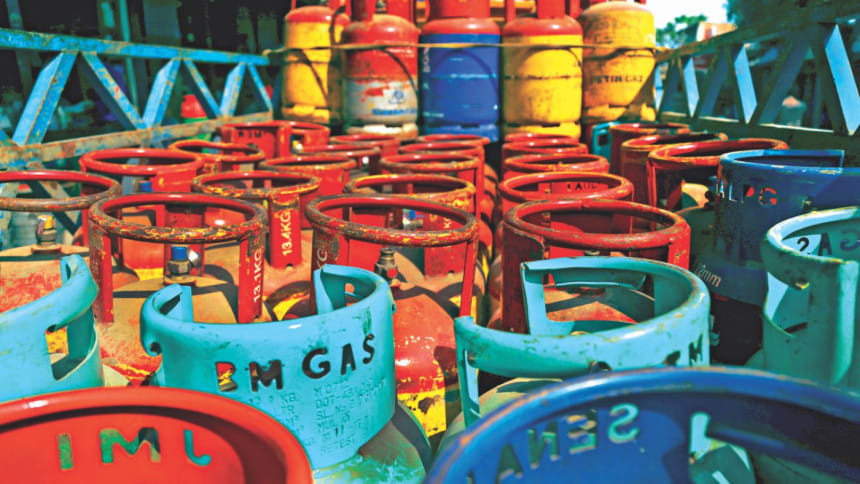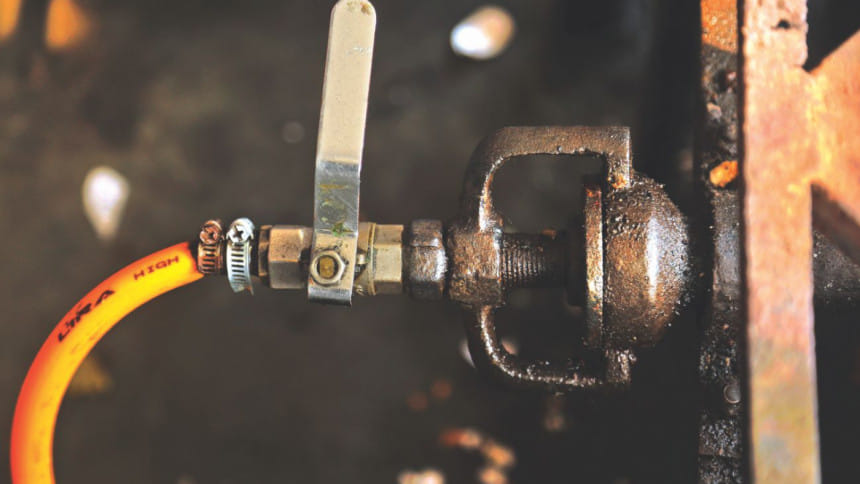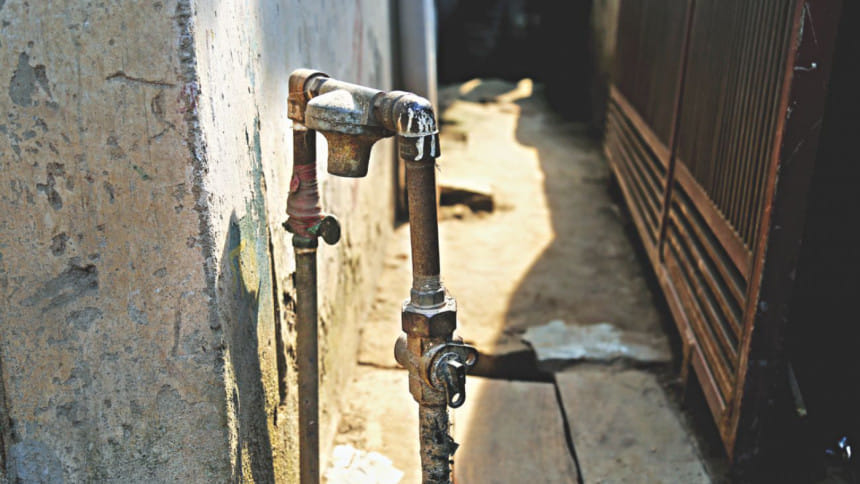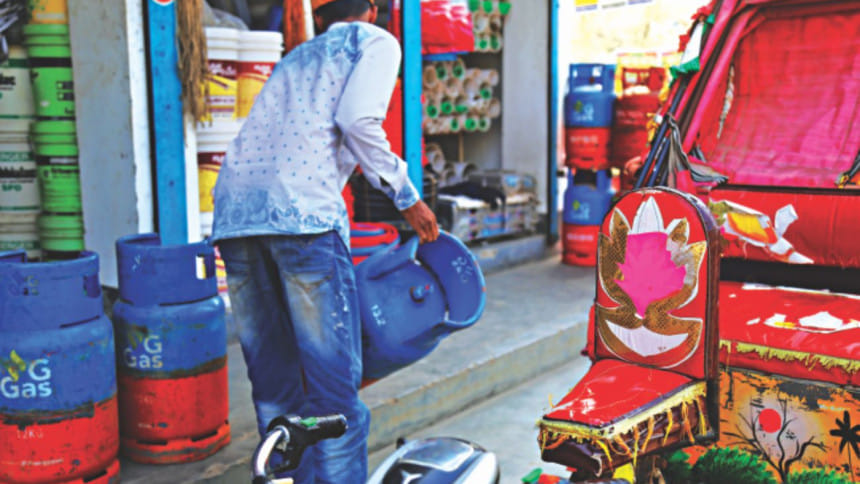Flammable Existence

For 20-year-old housewife Ripa, it was a usual weekend morning. Her one-year-old daughter Ayesha had woken her up at around 7 am and was repeatedly pointing to the window, wanting to go outside. Abdur Rob, Ripa's husband, who worked at a nearby garments factory in Jamgora, Ashulia, told his daughter that he would take her out for a morning outing after breakfast.
Rob stepped out from the room to go to the bathroom of their rented ground floor flat of the two-storied building. "My husband stepped out and I saw my mother-in-law coming to my room, and then all at once, I heard the sound of something exploding. Within seconds, my husband and my mother-in-law caught on fire and started screaming. My father-in-law ran to extinguish the fire, but he caught fire too," recalls Ripa, lying on a bed in the intensive care unit (ICU) of Dhaka Medical College Hospital (DMCH).
"I was dumbfounded, and with my baby on my lap, I rushed to my husband. But he didn't let me touch him, and asked me to keep the baby safe. At one-point, he opened the main gate, ran out to the nearby field and started rolling around on the ground desperately, with his whole body burning. But, that too, couldn't save him from the fire. Meanwhile, my baby and I were still inside," recalls Ripa.
The rest happened at the ICU of DMCH. Ripa'shusband and parents-in-law died one after another, in front of her. Her baby is still fighting for her life having suffered third-degree burns. Having undergone such trauma, Ripa seems indifferent to her own health condition with the right side of her body severely burnt. The mother and daughter are still undergoing treatment.

According to Ripa, her kitchen had first caught fire just 15 days before this tragedy, from a leaky gas pipeline. Luckily, no one was injured at that time. "When we informed the landlord about the incident, he showed up with a mechanic. The mechanic rolled some duct tape around the leakage. He assured us nothing risky would happen in the future."
Ripa's story is tragic but unfortunately not an isolated case. Six members of a family, including a child in Uttarkhan succumbed to their burn injuries after leaky gas pipes caused a fire in mid-October. A month before this incident, a seven-year-old child died from a fire from a gas leakage in the Ashulia area, where his parents were also severely burnt.
According to the Titas Gas Transmission and Distribution Company Ltd (TGTDCL), most gas pipeline explosions occur due to unauthorised connections taken illegally by landlords., as landlords pay hefty sums of money for such substandard and illegal connections. These above mentioned cases were due to the same. Back in 2014, an investigative report of The Daily Star found some 12,000 illegal gas connections given in nine unions of Sonargaon Upazila under Narayanganj district.
But what is more surprising is that there are allegations that some dishonest employees within the institutional umbrella are involved with the matter—of course, without the involvement of the syndicate, it is not possible to get an illegal connection from the state-owned gas company, claim experts.
In 2015, Bangladesh Energy Regulatory Commission (BERC) directed TGTDCL to take proper steps to stop illegal gas lines, based on the complaints filed by Consumer Association of Bangladesh (CAB), but nothing significant has been done. Shamsul Alam, Energy Advisor of CAB, who has long been outspoken about the corruption in TGTDCL, claims that although taking illegal connection is a cognisable criminal offence, TGTDCL is not disconnecting these huge unauthorised lines for financial gain. "They are not earnest enough to take necessary steps to settle these cases. These are public litigation cases and they could go to the High Court if they were careful enough," says Alam.

"In fact, they have not refunded the money of around 60,000 new connection demand notices worth Tk 1,00,000 each, although they have stopped giving new connections from 2014, except the approval of the advisory committee," adds Alam. "For every connection, the applicants had to pay a large sum of bribe along with the regular fee. Even a minister has to pay bribe for the connection, although he can request a new connection. And this has only become possible for the political power and impunity the organisation is enjoying," alleges Alam.
When contacted, Md Kamruzzaman Khan, TGTDCL's Director of Operations, admits incidents of the involvement of TGTDCL officials in illegal connections and states that if there is any evidence of wrongdoing by any employee, the company would take action against the perpetrator. According to him, in the year 2016-17, 11 personnel of the Company have been dismissed from their job and 38 contractor firms have been blacklisted as they were found involved with illegal gas connections.
"But, currently, the officials of TGTDCL are not involved with such crime," he claims, pointing the finger at unscrupulous businessmen who are active in providing such illegal lines. He also refutes the allegation of bribery of officials for disconnecting the illegal lines. "We are bound to take action if we come across such a case," he adds.
Apart from illegal lines, legal connections have also become death traps for the consumers as most lines are decades old and need thorough inspection. But TGTDCL has never played a significant role in repairing these. The basic responsibility of maintaining a gas connection falls on the consumers, however, many people aren't able to technically identify a leakage. Besides, since natural gas is odourless, one might not understand that the gas has filled the kitchen;if there is not enough ventilation, switching on the stove in case of a leakage can result in an explosion.

TGTDCL's director, however, informs Star Weekend that currently the company doesn't have any system to monitor every household line. They basically only repair the pipelines. Khan even openly denies their responsibility of the recent death and states that the company is not in any way responsible for the unconscious behaviour of the consumers that leads to accident. "If there is a leakage or unusual thing, the [consumers/household] must repair it on their own or inform our 18 regional control rooms. Our team will go and take necessary steps to address the problem. But most of the time, they are not conscious enough about their own problems. How can we know in which house there is a leakage? Is it possible in reality?" he asks. "We have an emergency control room where they can call to inform the problem."
But the fact remains, when the price of per unit gas is fixed, there is a charge included against the operation and maintenance cost for a quality and standard service, which all consumers pay. According to experts, it is TGTDCL's responsibility to ensure whether their gas has been distributed to the consumer in a safe, standardised and efficient manner, as the quality of a gas connection is determined by the standard of service they provide.
"They are supposed to monitor the leakage with routine-based inspections, maybe once a month, and during the inspection, if the consumers are found to be at fault, they can be fined too. But without such a system, by only talking about awareness, they cannot avoid their responsibility," says CAB's Alam. Responsibility of creating awareness also falls on the utility companies, as people may not know the technical aspects properly, without massive awareness-building campaigns or other such steps.
Dr Samonto Lal Sen, founding Project Director of the Burn Unit, DMCH, also believes that the way the death toll is rising, the issue of household gas maintenance must be addressed urgently. "In my three-decade-long career, I have never seen such a high number of patients from fires due to gas explosions."
Dr Sen also mentions that the lines are very old and the suppliers must send inspection teams to consumers' house with a card, at least once or twice a month and take the signature of the landlords after checking everything. "There must be a way to address this at the institutional level, and if the authorities are not concerned, we cannot address the problem by only giving treatment. Those who are dying and taking treatment here, are low and middle-income people and such an accident destroys a family."

A major risk of household gas accident is liquefied petroleum gas (LPG) cylinders—already 182 accidents have happened this year due to hose pipe leaks. Since household gas connections are no longer given and there is a crisis in pipeline gas, the use of LPG has increased significantly.
In small towns and rural areas where natural gas connections haven't reached yet, a large number of people are solely dependent on LPG cylinders. Though it has reduced the hassle of securing a household gas connection, it creates a risk too as many companies have been operating their businesses with leaky and substandard cylinders. According to the Department of Explosives, at least 16 companies have already been doing business with approximately 1.5 crore cylinders. And more are to come, with the government approving a total of 55 companies.
A leaky LPG cylinder is more dangerous than natural gas as it keeps its liquid format and is heavier than natural gas. So, even if there is proper ventilation, it can create a tremendous explosion. Star Weekend contacted Shamsul Alam, Chief Inspector of Explosives at the Department of Explosives, responsible for monitoring the LPG bottler companies, about the recent accidents of the leaky LPG cylinders. According to Alam, the department has investigated the accidents and found that in many cases, the cylinders did not actually explode. Rather, he points a finger at the consumers and says that there is lack of knowledge of consumers about using the gas cylinders properly.
"If the problem was the weakness of the cylinder or valves, we could hold the manufacturer or the company responsible. But in many cases, the cylinders are kept beside the stove and when it gets hot, it increases the pressure inside the cylinder. The safety device of the valve then emits a high amount of gas than the usual amount to prevent overpressure inside the cylinder. And this emitted gas, when mixed with the air, can cause an explosion," says chief inspector Alam.
However, Prof M Tamim, Special Assistant to the Chief Advisor on Power and Energy, says that the LPG companies are supposed to inspect their cylinders and any damaged cylinder should be withdrawn from circulation. But, unfortunately, the practice has not started properly. "Each company should give a leaflet to its users. Since the leakage of LPG is difficult to understand, there must be general awareness of the dealers too. And when the company distributes cylinders to the dealers, they must abide by their responsibility," he adds.
The authorities, however, seem oblivious of the increasing number of deaths and injuries through illegal and faulty lines and cylinders. Rather than address the pressing issue by identifying the shortcoming in their service delivery, institutional capacities and products, they appear content with victim-blaming and victim-shaming, shifting the attention from the corruption and inefficiency within their own institutions. Such blatant disregard for people's safety—and their lives—by service providers is not only unacceptable and unjustifiable, but can and should also constitute a criminal offence.

 For all latest news, follow The Daily Star's Google News channel.
For all latest news, follow The Daily Star's Google News channel. 



Comments